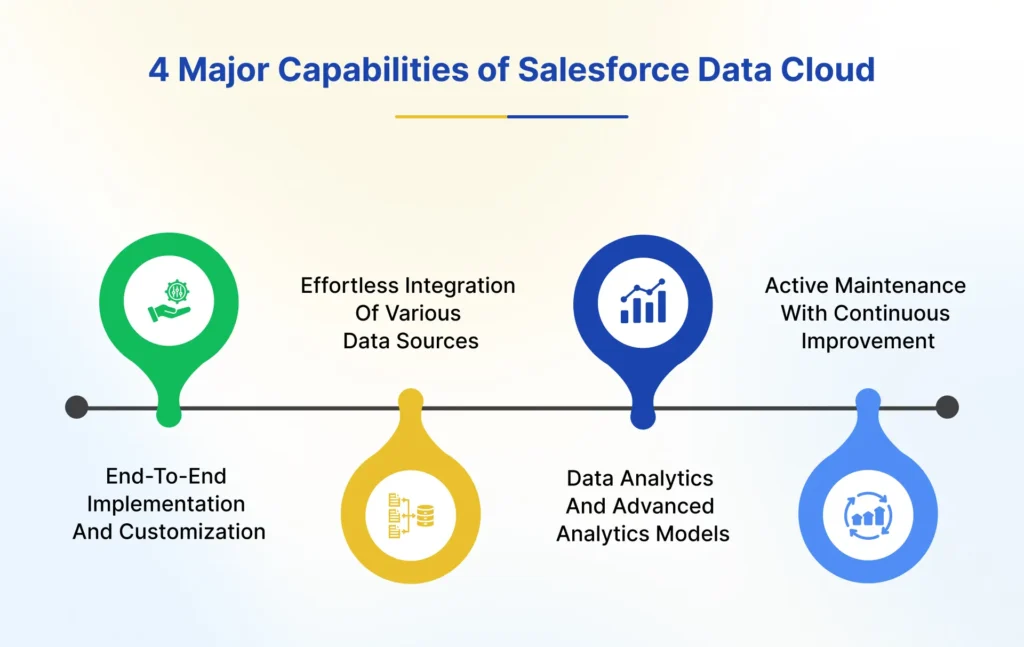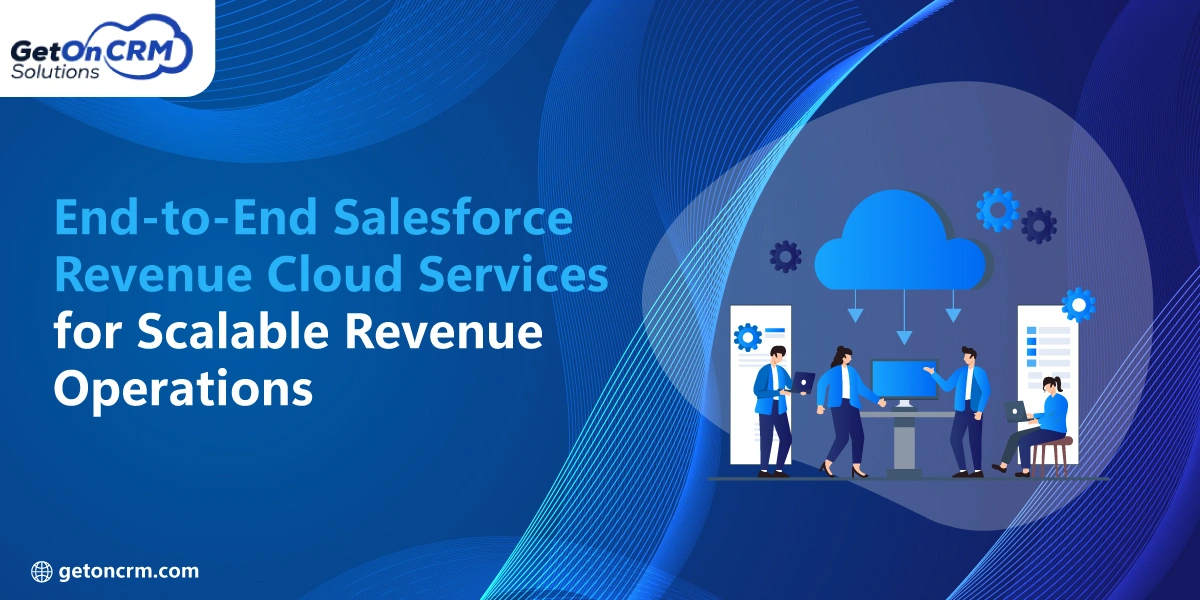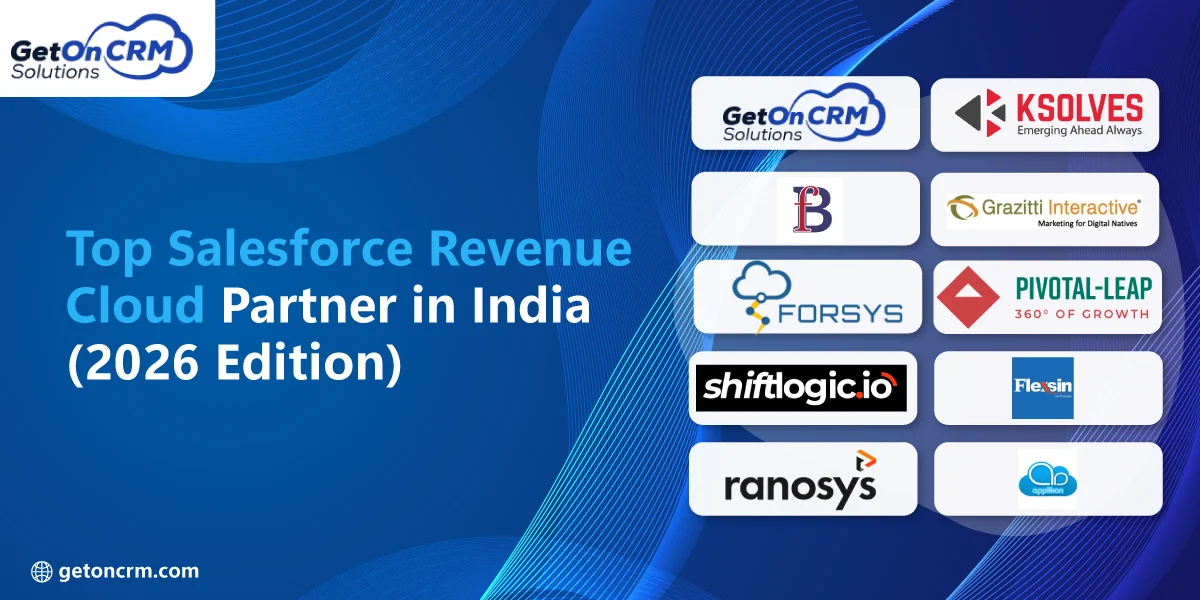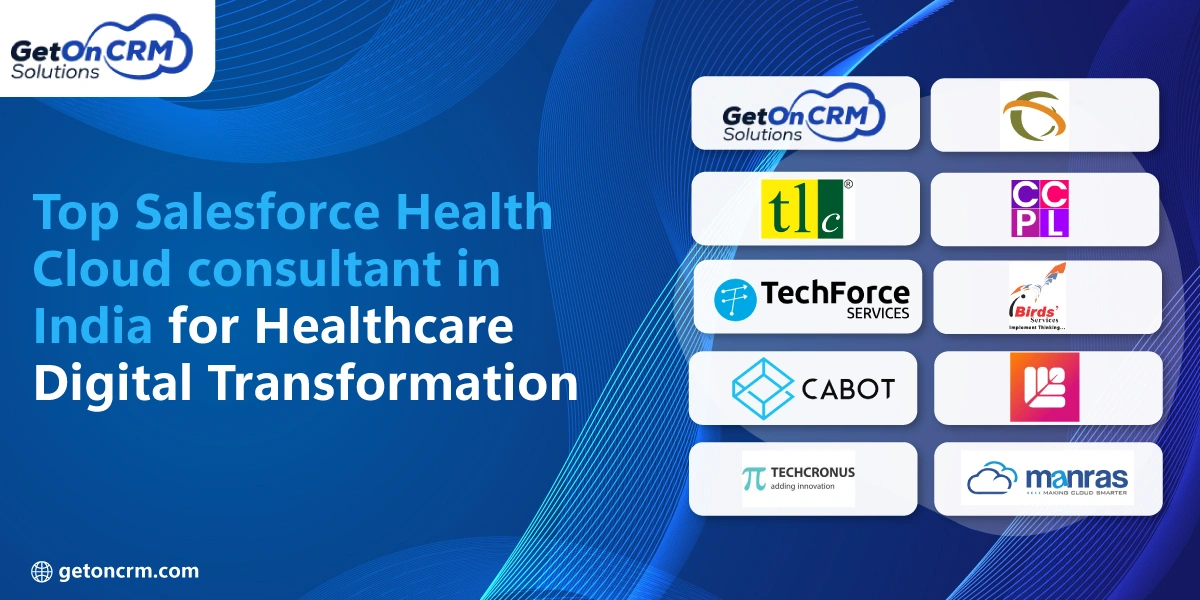In today’s rapidly evolving digital landscape, data stands as the cornerstone of business success. From understanding customer behaviors to predicting market trends, data drives decisions that can make or break a company.
However, harnessing this vast amount of information is not without its challenges. Many businesses grapple with fragmented data sources, leading to incomplete insights and missed opportunities. Enter the realm of Salesforce Data Cloud—a solution designed to address these very challenges.
The data cloud Salesforce offers is not just a mere storage solution. It’s a dynamic platform that brings together disparate data sources, providing businesses with a holistic view of their operations and customers.
Understanding Salesforce Data Cloud
The Platform is a customer data platform that helps businesses collect, unify, and activate data from multiple sources. It gives a complete view of customers and supports smarter decision-making and personalization.
It helps businesses, especially B2B enterprises gain a 360-degree view of their customers, enabling better personalization, smarter decisions, and improved customer engagement. With real-time insights and seamless integration, it turns raw data into actionable business intelligence.
To integrate Salesforce Data Cloud smoothly, this solution is for you. It offers easy setup and expert implementation services. It meets all your business data needs.
With expert support, companies can manage complex data environments and activate meaningful customer experiences through a centralized and scalable platform.
How Salesforce Data Cloud Stands Apart from Traditional CDPs
Unlike traditional Customer Data Platforms (CDPs), which gather customer data for marketing, this platform offers real-time activation. It also has advanced CRM integration, which adds more value for businesses.
Managing customer data with Salesforce Data Cloud helps organizations unify their data in a smarter and more flexible way. This turns scattered information into personalized experiences and data-driven choices at every customer interaction.
Here’s How Salesforce Data Cloud is Different:
- Real-Time Data Processing
The real-time data cloud lets data be collected, combined, and used right away. In contrast, CDPs usually work in batches. - Native CRM Integration
Salesforce’s CDP is not separately tied to the Salesforce ecosystem. They serve fully integrated to every Salesforce module which enables effortless workflows within sales, services, and marketing. - Identity Resolution
Salesforce’s unified data layer allows smarter profile unification and personalization through advanced identity resolution capabilities. - Scalability and Flexibility
Unlike many traditional CDPs, Salesforce is designed to efficiently cross-cloud large-scale data operations. - AI-Driven Insights
Salesforce’s smart data engine has built-in AI features like Einstein. These features provide predictive insights and automation. This means you don’t need third-party tools like traditional CDPs.
4 Key Capabilities of Salesforce Data Cloud
Data Cloud offers powerful capabilities that enable businesses to manage and leverage customer data more effectively. Here are the four key capabilities:

- End-to-End Implementation and Customization
Our team helps set up the implementation at every step. This ensures the data structure is efficient for use and access. - Effortless Integration of Various Data Sources
By combining different customer data sources, businesses can improve operations. They can do this by using easy integration and getting help during the setup process. - Data Analytics And Advanced Analytics Models
Empower your organization today with predictive analytics and stronger AI-powered Salesforce’s intelligent data engine features to make dependably smarter decisions. - Active Maintenance with Continuous Improvement
Experts use ongoing tracking and steady improvement to ensure success and reliability after their Salesforce Data Cloud integration. Show strong trust and smart planning in your cloud data management systems.
How Salesforce Data Cloud Helps Organizations Make Smarter Decisions
Organizations now more than ever need a single platform that can aggregate, analyze, and activate customer data with efficiency. With Data Cloud implementation services, organizations can manage business data with Salesforce, which enables improved decision-making and better customer interactions.
Step-by-Step Guide for Salesforce Data Cloud Implementation
Implementing Data Cloud effectively requires a structured approach to ensure accuracy, usability, and long-term success. Let’s see what the key steps look like:
- Define Business Objectives
Identify your key goals whether it’s improving customer engagement or consolidating fragmented data for a successful implementation strategy. - Data Mapping and Modeling
Structure your existing datasets to align with the real-time data cloud architecture for easier migration and integration. - Source System Integration
Connect systems like CRMs, ERPs, or marketing tools using native connectors or APIs for seamless Data Cloud integration. - Identity Resolution Configuration
Enable unified customer profiles by resolving identities across data sources to create a single source of truth. - Real-time Data Activation
Configure data streams to activate customer insights in real time for campaigns, service automation, and personalization. - Testing and Validation
Run test cases to ensure data integrity, performance, and correct rule configuration before going live. - User Training & Change Management
Ensure your teams are trained on using the new system effectively and are aligned with your business workflows. - Ongoing Monitoring and Optimization
Post-implementation, monitor system health, data syncs, and usage patterns for continuous improvement.
By choosing the right Data Cloud services, your business can use customer data better. This helps you make smarter decisions and create personalized experiences that make you stand out.
5 Key Benefits of Salesforce Data Cloud
Salesforce Data Cloud delivers powerful benefits that help businesses streamline data management, improve decision-making, and drive growth. Here are the five key benefits:

- Enhanced Customer Insights
The cloud gives companies a complete view of customer interactions, preferences, and behaviors. It does this by combining customer data from different sources. This permits better engagement and better retention. - Real-Time Data Activation
Enterprises can respond to market and customer shifts in real-time and analyze data on the spot. This instantaneous ability to respond to situations supports data-driven decisions with Salesforce. - AI-Powered Analytics
Integrated AI models provide predictive insights, thus automating the decision-making processes and improving forecasting accuracy. - Effortless Integration with Business Systems
The system integration guide helps companies connect with many CRMs, ERPs, and analytic systems. This improves workflow and makes operations more efficient. - Large Scale Operations Flexibility
The Cloud helps businesses store millions of customer records and manage large amounts of transaction data. It offers the flexibility and security that growing companies need.
As Salesforce Data Cloud improves, businesses can gain better analytics, more automation, and a personalized experience. This platform bridges the gap between extensive data collection and customer interactions, enabling real-time, actionable insights. To capitalize on these advancements and maintain a competitive advantage, businesses should integrate Data Cloud into their strategies.
Integration of Data Cloud Across the Salesforce Ecosystem
Unlocking your customer data requires understanding of Salesforce Data Cloud with other services. This overview highlights important Salesforce Clouds and their relationships with the setup and implementation of Salesforce Data Cloud.
Integration with Marketing Cloud
Utilize real-time customer information alongside campaign tools for more accurate targeting and automation with Marketing Cloud. It utilizes insights from Data Cloud to enhance engagement through tailored communication and to foster stronger relationships.
Integration with Service Cloud
Provide faster, tailored customer support by merging service data with Salesforce Data Cloud and the intelligent capabilities of Service Cloud. This creates a deeper understanding of customers and offers faster resolution of issues.
Integration with Sales Cloud
Improve opportunity tracking, lead scoring, and forecasting with real-time insights, all through the power of Sales Cloud. Sales Cloud is essential for managing business data. It uses Einstein AI to prioritize leads and spot sales trends. This helps teams close deals more quickly.
Integration with Einstein AI
Incorporate intelligent interaction at all levels with Salesforce Einstein AI predictive insights. When Data Cloud is utilized, it aids in making intelligent decisions powered by data.
Integration with Agentforce
Enhance agent productivity with unified customer profiles and AI-driven support using Agentforce. With Data Cloud implementation services, Agentforce enables context-rich dialogue, ensuring relevant conversations.
By using the real-time data cloud, businesses get a complete view of each customer. They also improve workflows and results with Salesforce Data Cloud. This cohesive strategy is beneficial, especially for B2B organizations where Data Cloud information precision and rapidity are critical.
Salesforce Data Cloud + Einstein GPT: Smarter AI for 2025
The powerful combination of Salesforce Einstein GPT with Data Cloud is reshaping how businesses deliver intelligent, context-aware customer experiences.
Let us see how Einstein GPT uses Data Cloud for Context-Aware AI Interactions.
With Data Cloud, organizations can access Einstein GPT’s new smart situational AI capabilities. Data Cloud’s real-time unified data enables Einstein GPT to provide the correct interactions at the right time over multiple channels.
Businesses will now use smart technology to create personalized experiences at every interaction point. This is all possible because of AI working together. Here’s how:
- AI-driven Experiences with Granular Personalization through Einstein GPT
A marketing message or product recommendation is designed for a customer’s engagement level. This is based on their behavior and preferences from the data unification layer. - Contextually Aware Chat for Smarter Customer Support
Real-time data helps Einstein GPT provide accurate and compassionate answers to customers’ queries. For example, a customer who recently changed their plan or made a complaint will receive a helpful response. - Scaling Email Personalization
Sales teams can now automate sending emails that require deeper personalization than just names. Actions like abandoned carts, viewed products, or service issues can trigger personalized emails. This is possible because of smart data systems. - Providing Predictive Analytics for Business Leaders
Customers get AI-based summaries, predictions, and insights from live data. This helps them make timely and trusted decisions.
Use Case of Salesforce Data Cloud
Personalized Banking Experience with Data Cloud
With the help of Data Cloud, banks are organizing customer data. This helps them provide better and more personalized services.
Case Study: Bank of America Achieves A Unified Customer View.
About it:
Bank of America used Data Cloud to integrate customer data from different departments into a fully single repository.
Challenges Faced:
The bank struggled with disparate systems that didn’t provide a complete understanding of customer relationships through different channels, including banking, mortgage, investment, and payments.
Solution:
By using Salesforce Data Cloud, U.S. Bank can provide a mixed service experience for customers. This also gives full insight into customer interactions. This improved service and encouraged more active customer interaction. Customers could connect through mobile phones, desktops, ATMs, and over 3,000 branches in 25 states.
Stats:
- Improved the management of customer relationships by having a central and consistent universal database.
- Enhanced collaboration and tailored solutions from different customer service departments.
- Improved servicing of customers using diverse access points.
What’s Next: Future Trends in Salesforce Data Cloud
As customer-centric approaches continue to evolve, The cloud is changing to keep up with emerging requirements. Salesforce’s intelligent data engine is evolving rapidly to meet the growing demand for real-time, AI-driven insights. This blog explores the key trends shaping its future such as deeper AI integration, enhanced customer personalization, and unified data strategies.
With businesses prioritizing connected experiences, Data Cloud is becoming a core engine for smarter decision-making. Stay ahead by understanding how these developments can streamline operations, improve customer engagement, and maximize the value of your data across the Salesforce ecosystem.
Understanding Of Salesforce Data Cloud Will Change Business Intelligence As We Know it Now.
As enterprises and B2B companies adopt the digital shift, Salesforce’s intelligent data engine advantages become clearer. From AI-enabled insights to tactical decision-making that enables companies to plan several steps ahead of the competition, it is indispensable in modern business intelligence.
As Expert Salesforce Data Cloud implementation evolves, businesses may soon benefit from more sophisticated analytics, increased automation, and personalized customer experiences. Companies should act now if they seek to take advantage of these features and sustain growth.
Frequently Asked Questions on the Salesforce Data Cloud Guide
What is covered in a Salesforce Data Cloud guide?
Such a guide outlines features, architecture, implementation best practices, integration strategies, use cases, data modeling, security, and tips to get the most from Data Cloud.
Why is a Data Cloud guide useful for businesses?
It helps organizations understand how to deploy, use, and scale Data Cloud effectively. The guide reduces missteps and accelerates value delivery from unified customer data.
Does the guide cover integration with existing systems?
Yes. It typically explains how to connect Data Cloud with CRMs, marketing platforms, ERPs, and third-party apps—ensuring smooth data flow across systems.
Will the guide discuss data modeling and architecture?
Absolutely. It covers how to structure customer data, define relationships, manage schemas, and design for scale to support analytics and personalization.
Does the Data Cloud guide include real-world use cases?
Yes. A good guide includes industry examples and case studies—showing how organizations apply Data Cloud for marketing, service, sales, and analytics.
Is security and compliance addressed in the guide?
Yes. It includes guidance on access controls, encryption, regulatory compliance (GDPR, CCPA), consent management, and secure data handling best practices.



















